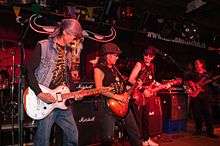Thierry Mekwattana
Suthiyong Mekwattana or commonly known as Thierry Mekwattana (Thai: สุทธิยงค์ เมฆวัฒนา, เทียรี่ เมฆวัฒนา; born: April 23, 1958) is a Thai singer and musician of Swiss and Chinese descent, he is best known as a member of Carabao, a famous and popular Thai rock and Phleng phuea chiwit (Thai protest song) band.
Thierry Mekwattana | |
|---|---|
 Thierry Mekwattana (third from left) with Carabao members, Preecha Chanapai (leftmost) Yuenyong Opakul (second from left) and Anupong Prathompatama (rightmost) in Switzerland on June 6, 2008. | |
| Born | Suthiyong Mekwattana April 23, 1958 |
| Other names |
|
| Occupation |
|
| Years active | late 1970s–present |
| Spouse(s) | Uthumphon "Jum" Silapan
( m. 1985; div. 2002) |
| Children | 2, including Mekhala "Jane" Mekwattana (daughter) and Mek "Jessie" Mekwattana (son) |
| Musical career | |
| Genres |
|
| Instruments |
|
| Labels | |
| Associated acts |
|
Biography and career
Thierry was born in Laos on April 23, 1958 to a Thai-Chinese father and Swiss mother. His father Anek Mekwattana (เอนก เมฆวัฒนา) is a Thai Chinese, he worked for the United States's CIA with the delivery of military equipment to the US Army. Later, when a coup in Laos in 1960 he led his family to settle in Thailand permanently. His mother named Simone was a Swiss. In addition, he is also a cousin to Sondhi Limthongkul, a Thai journalist who is owner and founder of the Manager Daily newspaper and also a political activist. Because his father was a younger brother of Sondhi's mother.[1]
He started playing guitar at the age of 11 with Cliff Richard's Flying Machine was the first song. His father did not like, but his mother is a supporter and encouragement. His favorite artists are Bob Dylan, Don McLean, The Beatles and Queen.
He entered the entertainment industry in the late 1970s to early 1980s as a model and actor, he acted round about 2–3 films as a lead role character. He released folk albums with Kittikhun "Kung" Chiansong ("กุ้ง" กิตติคุณ เชียรสงค์) and Paijit "Jung" Ugsornnarong ("จุ๋ง" ไพจิตร อักษรณรงค์). He later went on to study business administration at American Business Institute, New York City, United States.
In 1983, he had his first chance to play music with Carabao as a guest musician. He was persuaded to join Carabao along with two fellow musicians, Thanit Siiklindii and Amnaat Luukjan. They became members of the band ever since.
His famous singles with Carabao are Naang Ngaam Tuu Kracok (นางงามตู้กระจก) in the fifth album Made in Thailand in December 1984 and Mae Sai (แม่สาย) in the ninth album Thap Lang in November 1988, both of them have content about the issue of prostitution in Thailand.
In 1990, he released his solo album Jor Wela Ha Pujjuban (เจาะเวลาหาปัจจุบัน), the single is popular on this album is Papaya PokPok (ปาปาย่าป๊อกป๊อก) which the content is about a popular Thai food Som Tam (ส้มตำ) or Green papaya salad.[2]
In the film Young Bao The Movie released in 2013 with a story about Carabao in the beginning. His character is represented by Chulachak "Hugo" Chakrabongse and his own childhood, acted by his son Mek "Jessie" Mekwattana. [3]
Personal life
Thierry married an actress Uthumphon "Jum" Silapan ("จุ๋ม" อุทุมพร ศิลาพันธุ์) the couple had two children, Mekhala "Jane" Mekwattana ("เจน" เมขลา เมฆวัฒนา) and Mek "Jessie" Mekwattana ("เจสซี่" เมฆ เมฆวัฒนา), but in early 2002 they divorced.[4]
In February 2010, he was reportedly hospitalized from attempting suicide by gun. But the truth he is a severe gastritis.[5]
References
- ""สนธิ"ย้อนรำลึกพระคุณแม่-เตือนเด็กรุ่นหลังอย่าทำให้แม่ชอกช้ำ". ASTV Manager (in Thai). August 10, 2009. Retrieved October 20, 2017.
- เจ้าของร้าน. "เส้นทางชีวิตของ เทียรี่ เมฆวัฒนา ก่อนจะได้เป็นยอดมือกีตาร์แห่งวงคาราบาว". Guitarrich (in Thai). Retrieved October 20, 2017.
- "คาราบาว" ทรงพลัง ดึง ตูน-เป้-ฮิวโก้-เต๋า สวมบท "ยัง บาว". Major Cineplex (in Thai). August 3, 2012. Retrieved October 26, 2017.
- "'อุทุมพร'เปิดใจ!! กลับมาดูแล'เทียรี่'อยากเป็นครอบครัวที่สมบูรณ์ ลุ้นรีเทิร์น-รับผิดเอง(คลิป)". Khao Sod (in Thai). September 21, 2017. Retrieved October 20, 2017.
- "เทียรี่ผ่าตัด ลือยิงตัว หามเข้ารพ.วันศุกร์". Thairath (in Thai). February 13, 2010. Retrieved October 20, 2017.